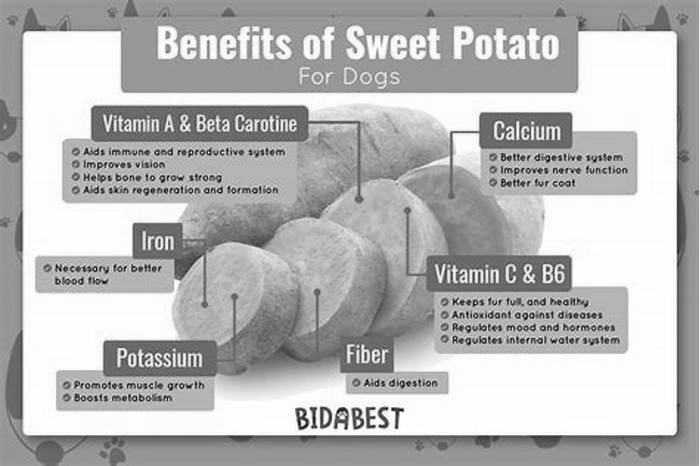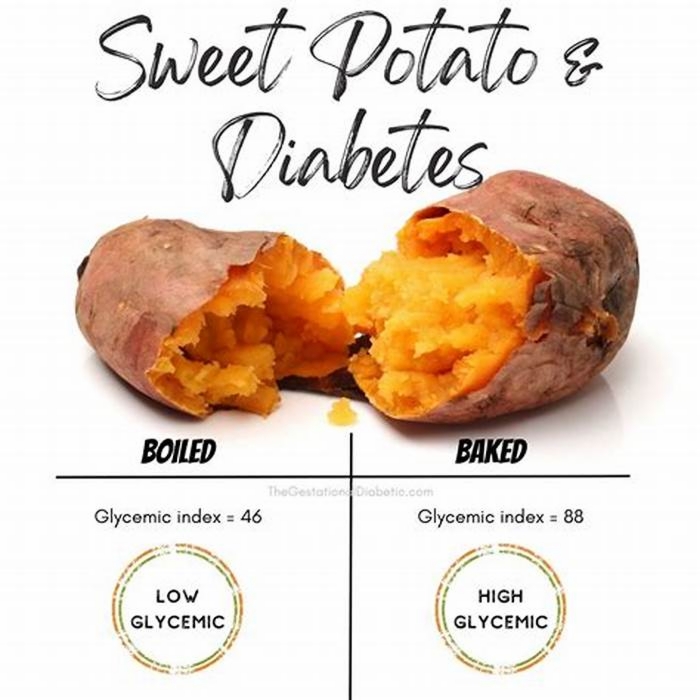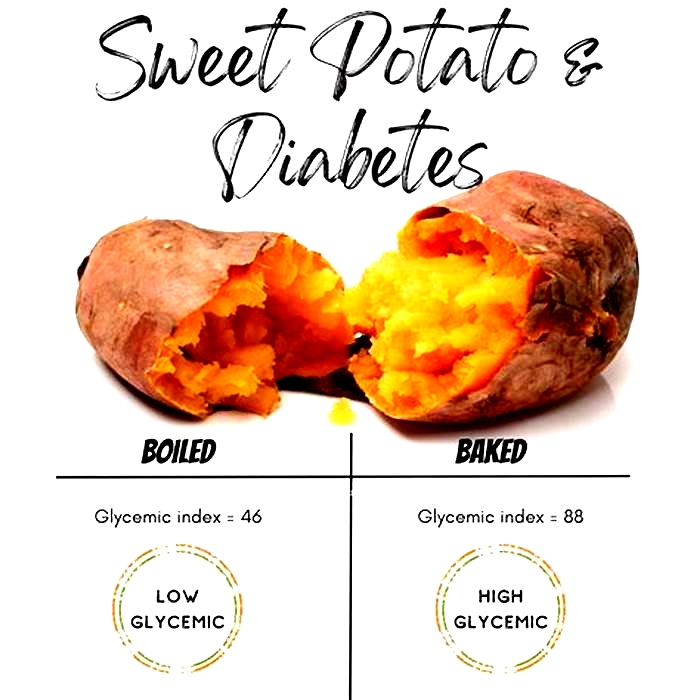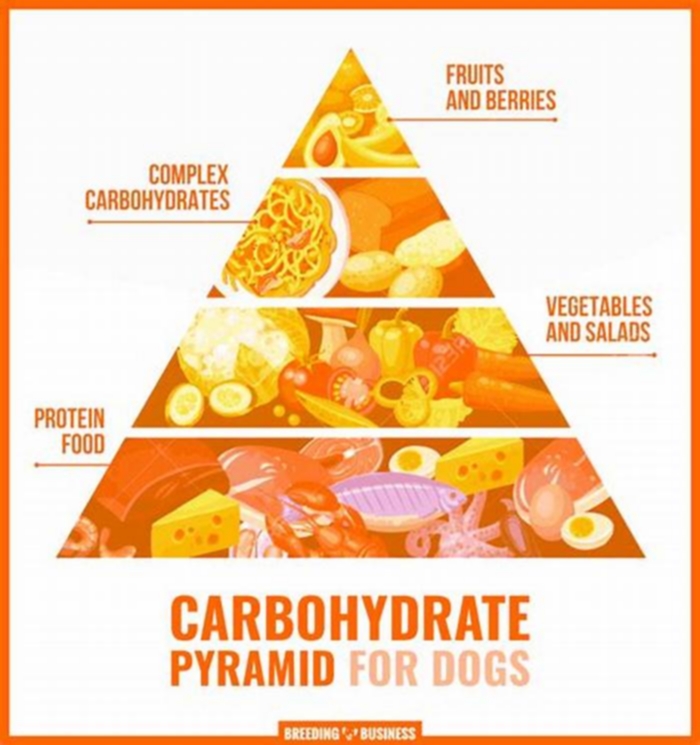Is Sweet Potato a carbohydrate for dogs

0 Comments
About sweet potatoes
Originally native to tropical regions of the Americas and dating back some 5,000 years, sweet potatoes are only distantly related to potatoes despite their shared name. They are in fact rather surprisingly related to bindweed and morning glory. Neither of which seems to visually share any resemblance whatsoever with the tuberous root vegetable we and our dogs know and love so much. So what about sweet potatoes for dogs?
Nutrients in sweet potatoes
Sweet potatoes are an excellent source of vitamin A and a good source of vitamin C and vitamin B6. Theyre also a good source of calcium, copper, iron, magnesium, manganese and potassium.
Benefits of sweet potatoes for dogs
High in fibre and low in fat, sweet potatoes help support a healthy immune system. Due to their high dietary fibre content, they also support a healthy digestive system in both humans and dogs.
Sweet potatoes are said to protect against heart disease and to have anti-aging properties which help fight against cancer.
Gluten and of course grain-free, sweet potatoes are a useful source of necessary carbohydrates for dogs. As a canine nutritionist I can tell you that mine simply adore them!
0 Comments
What are carbohydrates?
There are six categories of nutrients. Fats, proteins, vitamins, minerals, water and, the subject of this article, carbohydrates. Carbohydrates are themselves a group of macronutrients which can be further subdivided into two distinct groups. Simple carbohydrates and complex carbohydrates. The question is, do dogs need carbohydrates in dog food?
Simple carbohydrates
Simple carbohydrates are the simplest of the two carbohydrate forms. They are essentially sugars and are found in the likes of cheap and highly refined grains such as white rice and refined flours. They are also found in fruits. Simple carbohydrates can be further broken down into monosaccharides and disaccharides. Quickly and easily metabolized, these simple carbohydrates are better known as glucose and sucrose. They are an ideal source of short-term energy.
Complex carbohydrates
Complex carbohydrates meanwhile are made up of larger, more complex molecules. These are called polysaccharides. Digested more slowly, these are further subcategorized as starches and fibres.
Starches are broken down by digestive enzymes in the pancreas before becoming available for your dogs needs. Starches are found in the likes of grains, vegetables and legumes.
Fibres, both soluble and insoluble, are found only in unprocessed whole foods (plant food) such as vegetables. These are not broken down by digestive enzymes in the digestive tract but pass through your dogs digestive system relatively intact. These ensure good digestive health.
Complex carbohydrates provide slow-release energy. They aid digestion, help maintain the immune and nervous systems and help regulate the metabolism. Unprocessed, complex carbs such as fresh fruit and vegetables, brown (and some white) rice, quinoa, oats and sweet potatoes are all excellent for dogs.
Why carbohydrates benefit dogs
Research suggests that approximiately 14% of the ancestral dogs diet would have been made up of carbohydrates. That said, dogs do not actually need carbs in the same way that they need the other two macronutrients. Fats and proteins.
But that doesnt mean that dogs should not be fed carbohydrates. Those who suggest that dogs should not be fed carbs overlook one simple fact. That is that any source of complex carbohydrate, sweet potato for example, provides beneficial nutrients, minerals and natural fibre. And that is in addition to being a valuable, readily available and highly digestable source of slow release energy. They also overlook the fact that without carbohydrates and without fats, a dog would use protein as its main source of energy. Protein which is best reserved for maintaining and repairing your dogs body.
Can Diabetic Dogs Eat Sweet Potatoes: 10 Nutritional Benefits & Feeding
Can Diabetic Dogs Eat Sweet Potatoes?
As pet owners, it can be tough to see our furry companions struggle with health issues, especially when it comes to managing a chronic condition like diabetes.
In recent years, there has been much debate about whether or not diabetic dogs can safely consume sweet potatoes, a popular and nutritious human food.
In this article, we will delve into the topic and explore the 10 nutritional benefits of sweet potatoes for diabetic dogs, as well as how to properly prepare them for your beloved pups diet.
So, grab it all in this article.
Can Diabetic Dogs Eat Sweet Potatoes
As a responsible pet owner, its important to carefully consider the dietary needs of our furry friends, especially if they have special health conditions such as diabetes.
When it comes to sweet potatoes, its good news for diabetic dogs!
These root vegetables are a fantastic addition to their diet, thanks to their low glycemic index.
Unlike other starchy foods that can cause blood sugar spikes, the natural sugars in sweet potatoes are released slowly, providing a steady supply of energy without drastically impacting glucose levels.
Additionally, sweet potatoes are packed with beneficial nutrients like fiber, vitamins, and minerals, making them a wholesome choice for our diabetic canine companions.
However, moderation is key, as too much of anything, even the healthiest foods, can still be detrimental.
It is essential to consult with your veterinarian to determine the appropriate portion sizes and to ensure that incorporating sweet potatoes aligns with your dogs overall diet and specific health needs.
Importance Of Proper Diet For Diabetic Dogs
Diabetes is a common health condition that affects not only humans but also our furry friends.
As responsible pet owners, it is up to us to ensure that our diabetic dogs receive the proper care and attention they need.
One key aspect of managing diabetes in dogs is maintaining a suitable diet.
Just like in humans, a proper diet plays a vital role in controlling blood sugar levels and preventing complications associated with this chronic disease.
By providing diabetic dogs with a carefully balanced diet, rich in high-quality proteins, complex carbohydrates, and fiber, we can help regulate their blood glucose levels and support their overall well-being.
Moreover, a well-planned diet helps prevent obesity, aids in weight management, and minimizes the risk of other health issues, such as heart disease and joint problems.
So, understanding the importance of a proper diet for diabetic dogs is essential for ensuring their long and happy lives.
Nutritional Benefits of Sweet Potatoes For Diabetic Dogs
If you are a dog owner and your beloved pet has been diagnosed with diabetes, you may be wondering if sweet potatoes can be a part of their diet.
The good news is that sweet potatoes can indeed be beneficial for diabetic dogs.
These root vegetables are packed with essential nutrients that can help support your four-legged friends overall health and wellbeing.
Here are ten nutritional benefits of sweet potatoes specifically tailored for diabetic dogs.
1. Low Glycemic Index: Sweet potatoes have a low glycemic index, meaning they cause a slower rise in blood sugar levels, making them a suitable carbohydrate option for diabetic dogs.
2. High Fiber Content: These tubers are rich in dietary fiber, which aids in digestion, regulates blood sugar levels, and promotes a feeling of fullness, preventing overeating.
3. Complex Carbohydrates: Sweet potatoes are a complex carbohydrate source that provides a steady release of energy, preventing spikes and drops in blood sugar levels.
4. Vitamin A: These vibrant orange vegetables are an excellent source of vitamin A, promoting healthy vision, immune function, and cell growth in diabetic dogs.
5. Vitamin C: Sweet potatoes are loaded with vitamin C, an antioxidant that supports immune health, reduces inflammation, and aids in collagen production for healthy joints and tissues.
6. Potassium: Diabetic dogs often face electrolyte imbalances, and sweet potatoes can help with that.
Their high potassium content aids in maintaining proper fluid balance, muscle contractions, and nerve function.
7. Antioxidants: The antioxidants present in sweet potatoes, such as beta-carotene, can help fight cellular damage caused by diabetes and reduce the risk of chronic diseases.
8. Anti-inflammatory Properties: Sweet potatoes contain anti-inflammatory compounds that can mitigate inflammation in diabetic dogs, supporting overall health and preventing complications.
9. Vitamin B6: These tubers are an excellent source of vitamin B6, which plays a vital role in brain function, red blood cell production, and hormone regulation in diabetic dogs.
10. Minerals: Sweet potatoes are a rich source of essential minerals like manganese, which aids in metabolizing carbohydrates and regulating blood sugar levels in diabetic dogs.
As always, it is essential to consult with your veterinarian before making any changes to your diabetic dogs diet.
They will provide personalized advice based on your dogs specific needs and medical condition.
With their approval, incorporating sweet potatoes into your furry friends diet can provide numerous nutritional benefits and contribute to their overall well-being as they manage their diabetes.
Risks And Considerations
When it comes to feeding your diabetic dog, there are many risks and considerations to keep in mind.
While sweet potatoes may seem like a healthy option for dogs, they can actually pose some potential dangers for diabetic dogs.
First and foremost, sweet potatoes are high in carbohydrates which can cause spikes in blood sugar levels for diabetic dogs.
Additionally, the skin of sweet potatoes contains solanine which is toxic to dogs if consumed in large quantities.
Other factors such as portion control and monitoring overall diet must also be taken into consideration when deciding whether or not to feed your diabetic dog sweet potatoes.
Its important to consult with a veterinarian before making any changes to your dogs diet.
Preparing Sweet Potatoes For Diabetic Dogs
A. Cooking methods
If you have a diabetic dog, you may be wondering if they can eat sweet potatoes.
The answer is yes, but its important to prepare them in the right way.
Here are 5 cooking methods for preparing sweet potatoes for your diabetic dog:
1) Baking: This method involves baking the sweet potato in the oven until it becomes soft and tender.
You can then mash or puree it before serving it to your dog.
2) Boiling: Boiling is another option for cooking sweet potatoes for your diabetic dog.
Simply peel and chop the sweet potato into small pieces and boil them until they become soft enough to mash.
3) Steaming: Steaming is a healthy way of cooking vegetables, including sweet potatoes.
It helps retain most of their nutrients while making them easier to digest for dogs with diabetes.
4) Microwaving: If youre short on time, microwaving is an easy and quick way to cook sweet potatoes for your furry friend.
Just poke some holes in the skin with a fork and microwave on high heat until they are soft.
5) Dehydrating: For a tasty treat that will last longer, try dehydrating slices of cooked sweet potato in a food dehydrator or low-temperature oven.
Your diabetic dog will love these chewy snacks!
B. Avoiding toppings and seasonings
As a pet owner, its natural to want to provide your diabetic dog with the best possible diet. Many people wonder if sweet potatoes are safe for their furry friends.
The good news is that yes, diabetic dogs can eat sweet potatoes!
However, its important to prepare them in a way that wont harm your dogs health.
This means avoiding toppings and seasonings such as butter or sugar which can cause spikes in blood sugar levels.
Instead, opt for plain boiled or baked sweet potatoes as an occasional treat for your beloved pup.
C. Incorporating into homemade dog food
As a pet owner, its natural to want the best for your furry friend.
If you have a diabetic dog, you may be wondering if they can eat sweet potatoes as part of their diet.
The good news is that yes, diabetic dogs can eat sweet potatoes!
In fact, incorporating them into homemade dog food can provide numerous health benefits such as regulating blood sugar levels and promoting digestive health.
When preparing sweet potatoes for your diabetic dog, make sure to cook them thoroughly and avoid adding any sugary or fatty toppings.
With proper preparation and moderation, sweet potatoes can be a delicious addition to your pups meals.
D. Appropriate serving sizes
For diabetic dogs, it is important to carefully consider their diet and the types of food they consume.
One question that often arises is whether or not diabetic dogs can eat sweet potatoes.
The answer is yes, but with some precautions. Sweet potatoes are a good source of fiber and nutrients for dogs, including those with diabetes.
However, its essential to prepare them in an appropriate serving size for your dogs needs.
Too many sweet potatoes could cause spikes in blood sugar levels, so its best to consult with your veterinarian about the right amount for your furry friend.
With proper preparation and portion control, sweet potatoes can be a healthy addition to a diabetic dogs diet.
Alternatives To Sweet Potatoes For Diabetic Dogs
For diabetic dogs, it is important to carefully monitor their diet and ensure they are not consuming foods that could spike their blood sugar levels.
While sweet potatoes may seem like a healthy option for humans, can diabetic dogs eat them?
The answer is no, as the high carbohydrate content in sweet potatoes can be harmful to diabetic dogs.
However, there are plenty of alternatives available such as green beans, pumpkin puree, and carrots which provide similar nutrients without causing any harm to your furry friends health.
Its always best to consult with your veterinarian before making any changes to your dogs diet.









